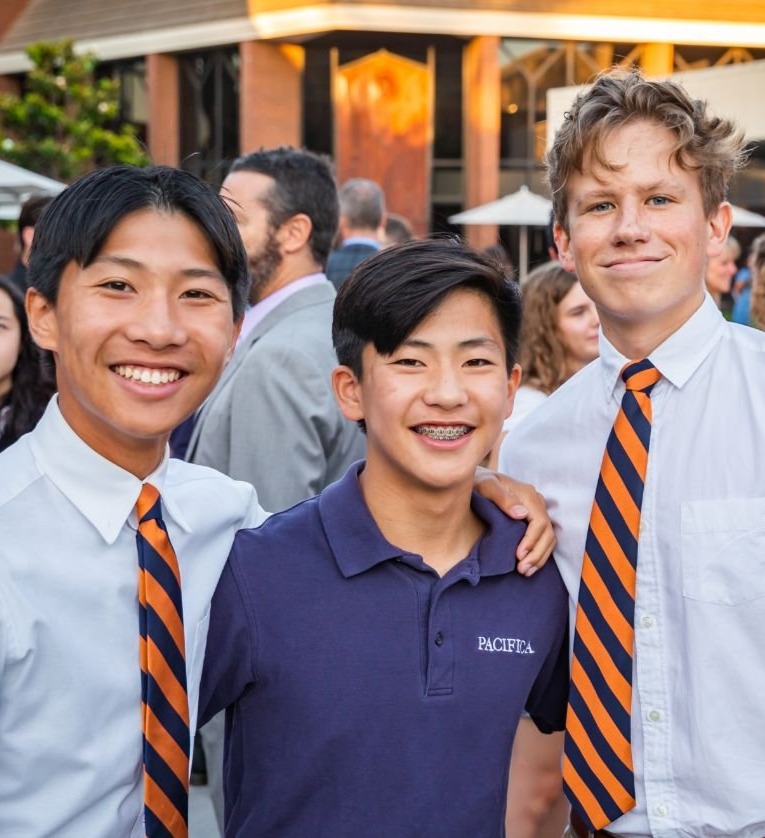Grace, Truth, and Time
November 21st, 2023
Grace and Truth & The Story of a Student Returning Over Time
by Dr. Ben Roberson
One of the rewards of working at Pacifica is meeting with alumni and hearing how their time at our school has influenced their adult lives. A few of our staff recently had such an encounter when they were joyfully greeted by a former student.
It’s important to understand the backstory of this student, whom we will call Aaron. Aaron is bright, athletic, articulate, and was raised in the Church. Despite his potential, he spent much of his time at home and school distancing himself from the beliefs and people who cared for him. He openly expressed his rejection of the Christian faith, his teachers, and his educational experience at Pacifica.
So, when Aaron extended his warm welcome to this gathering of Pacifica’s diligent staff, they were surprised by his joy. He went on to share his journey in college, where he witnessed the party scene, substance misuse, and a culture at odds with the morality of the Christian faith he had rejected but was so accustomed to. It was during his first year of college when Aaron was most clearly able to see the unsightly consequences of a life that seeks instant self-indulgence. Aaron shared that this experience led him to reflect on and miss Pacifica’s culture.
Aaron went on to explain that he had since transferred to a different school, found a healthier community, and is now considering seminary following his undergraduate studies. Even though Aaron is still struggling with many things, it is significant that he articulated a desire to look back into many of the ideas and relationships he was introduced to at Pacifica and to see them as good.
This is a story of a student who was given something to hold onto, push away from, and then return to in the course of time. This narrative is instructive and it gives hope by demonstrating the impact of a culture founded on grace, truth, and time.
Giving Grace
As described in Pacifica’s Approach to Teaching and Learning, “We want the fullness of God’s grace in all our relationships; extending compassion, understanding, long-suffering, and forgiveness to others.”
Giving grace is most difficult in the moment of our students’ failures or willful disobedience. This may look like a student breaking trust through a series of bad decisions, unlike the ones you've seen from him before. It is in these moments that we can become frustrated, exasperated, and even lose hope for the future of our students' well-being.
The practice of giving grace to our students when they err, either because of their lack of understanding or their lack of virtue, begins with remembering that we have erred ourselves and been given grace by Christ. We need to consistently recall our own failures, our own need for grace, and the reality that we have not yet been fully sanctified. Through the lens of our own need for grace, we see more clearly the importance of extending compassion, forgiveness, and grace to our students in their moments of failure. We also see that grace is the path to healing.
According to John’s Gospel, the Father's gift to mankind is Jesus, a man who integrated grace and truth in all he did. That is the example we seek to follow—by God’s grace—in shaping Pacifica’s culture and each of our students.
Teaching Truth
In tandem with giving grace, teaching truth is paramount to Pacifica’s culture. As further described in the school's Approach to Teaching Learning, “Pacifica’s school culture emanates from the pursuit of grace and truth in all relationships. We believe truth sets students free.”
Providing students a steady diet of truth is difficult.
For example, Aaron actively fought against what was taught in his Faith and Culture class because truth was contrary to what Aaron preferred. For students, truth can be hard to receive because it often goes against their desires and appetites. For the parent or teacher, teaching the truth is difficult because it means a student may reject you for a time because they don’t like an idea or feel that it is cutting against something they want to keep.
The same could be said for practicing a process that forms students towards truth; a teacher providing an exam that requires prior study, or making them speak in discussion, or grading to a standard that demands growth, or even holding a student accountable for being tardy. For the adult, they risk the student not liking them because, for the student, the process is hard.
The paradox lies in the fact that the challenging process of giving and receiving truth is often met with resistance by both adults and students and is the very catalyst that sets students free. Truth frees students to know God, themselves, and their world. The path to freedom involves courage and persistence in the face of difficulties.
Allowing Time
Maturity takes time.
It is a healthy practice to reflect on who we were at the age of our students. Consider your own habits of thinking and being when you were 14 to 18 years old. In light of who you were, consider your own maturity from then to present day. This self-reflective practice is a reminder that maturity takes time, even with a steady diet of grace and truth.
For some students, that time is longer than for others. Our role as parents and teachers is to provide truth that students can hold onto, push off from, and return to; in tandem, provide grace that is compassionate and long-suffering in step with the life modeled by Christ.
Amidst our provision of grace and truth over time, it’s important to recognize that students are learning not just from what we say, but perhaps more so from our manner of engaging them.
Modeling the Way
As our students’ beliefs, emotions, and behaviors move up and down at a frantic pace, our charge as mature adults is to be a steady non-anxious presence. This includes remaining calm, composed, and emotionally stable in the face of challenging and complex moments. This does not mean having all the answers. It does require, however, that you put your trust outside of yourself and into the hands of God as you seek their good rather than your own glory. And it requires the disposition of a mature adult mentor rather than an older friend.
When you commit yourself to habits of Christian living, including but surely not limited to prayer, scripture reading, and a commitment to a local Church body, at least two fruits emerge relative to this conversation:
First, you model the life you want for your student because, in the end, the Christian life is more often caught than taught.
Second, your own faith is deepened and your own anxieties, judgements, and overreactions fall away and are replaced with the steady non-anxious presence of Christ. Your self-worth becomes wrapped up in what God thinks of you, rather than your own ability to form a child.
The Transformative Nature of Grace, Truth, and Time
Aaron’s story is not an isolated case. It is a reflection of the transformative nature of Pacifica’s culture that has the courage to teach truth, the compassion to give grace, and the patience and Holy trust to provide time, all under the guidance of adults who emanate a steady non-anxious presence rooted in a life that models a sincere commitment to the way of Christ.








.jpg?v=1677078481949)


_-2.jpg?v=1677078725816)
.jpg?v=1677078837139)
